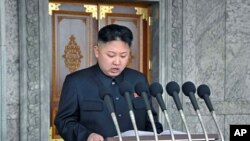A U.S. congressional panel has held a hearing called "North Korea After Kim Jong Il: Still Dangerous and Erratic." The hearing on U.S. policy towards North Korea coincides with Pyongyang's announcement that it will no longer abide by an agreement to halt testing of nuclear devices and long-range missiles after Washington canceled food aid.
House Foreign Affairs Committee Chairman Ileana Ros-Lehtinen of Florida says the Obama administration has fallen into the same failed pattern of negotiations with North Korea, followed by betrayal by Pyongyang, that the Bush and Clinton administrations had also pursued in vain. She says the new North Korean leader, Kim Jong Un, seems to be following in his late father Kim Jong Il's footsteps, in responding to an outstretched hand by provoking the world with last Friday's failed rocket launch.
"North Korea's rhetoric should have told our negotiators all they needed to know," said Ros-Lehtinen. "The 'military first' policy of starving the people to feed the army and supply the munitions industry remains. The South Korean Defense Ministry estimated this month that the North Koreans spent $850 million on the failed missile launch - enough to buy corn to feed the entire population for an entire year."
The lawmakers and experts present at the hearing agreed that North Korea has shown that it is indeed still dangerous and erratic. Michael Green of the Center for Strategic and International Studies says he believes we may see a North Korean nuclear test in the future.
"So the North is clearly heading towards a nuclear weapons capability, deliverable through ballistic missiles or through country transfer, and our efforts to date have slowed but hardly deterred them from that path," said Green.
Scott Snyder of the Council on Foreign Relations says the United States has long made negotiations the cornerstone of its North Korea policy, and he believes this is a mistake.
"There is no deep harm in talking to North Korea, we can learn a lot, it is an important aspect of our diplomacy," said Snyder. "But I think the National Security Council meetings on North Korea should begin with pressure, coercion, interdiction, implementation of sanctions, and then at the end consider where the diplomatic and engagement piece fits in, and I think we have had it backwards for some time."
In response to last week's failed rocket launch, the United States canceled its offer to provide tons of food assistance to North Korea. Republican Congressman Dana Rohrabacher of California says he believes Washington should not be doing this in the first place, because the North Korean government prevents the food aid from actually being distributed to North Korean citizens in many parts of the country.
"When did the United States assume the responsibility for the nutrition of the North Korean people? I mean, this is, again, this is a looney [crazy] policy on our side," said Rohrabacher.
The expert witnesses at the hearing said they do not feel that it is a good idea to link nuclear negotiations with North Korea to food aid for the country's starving population, but agreed that Pyongyang should agree to let international relief agencies distribute the food.
News
US Lawmakers Call for Tougher Approach to North Korea
- By Cindy Saine








